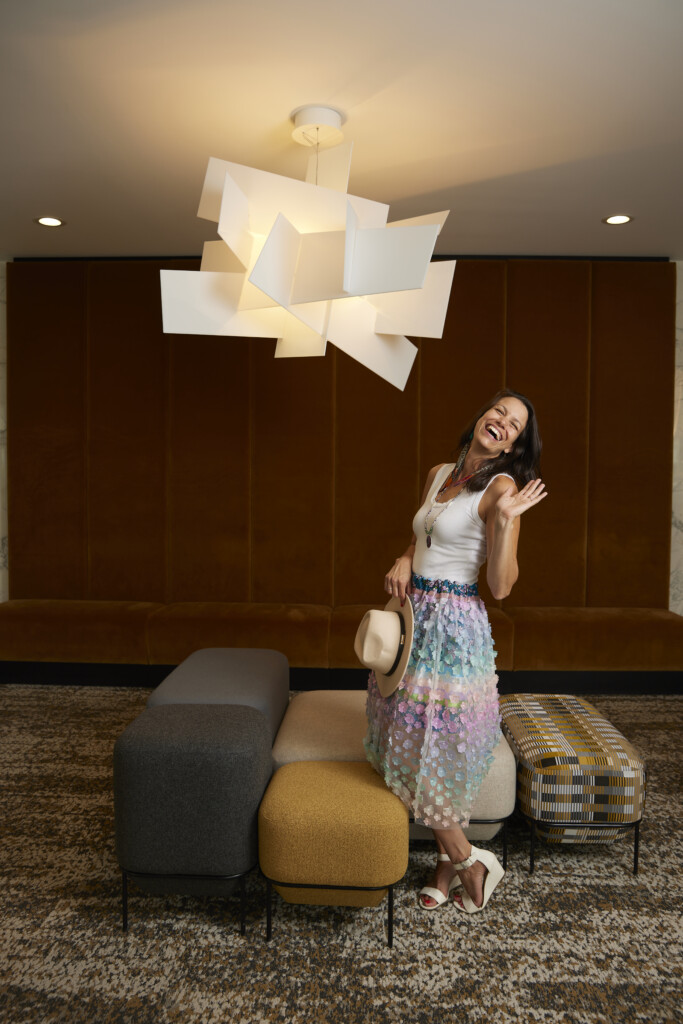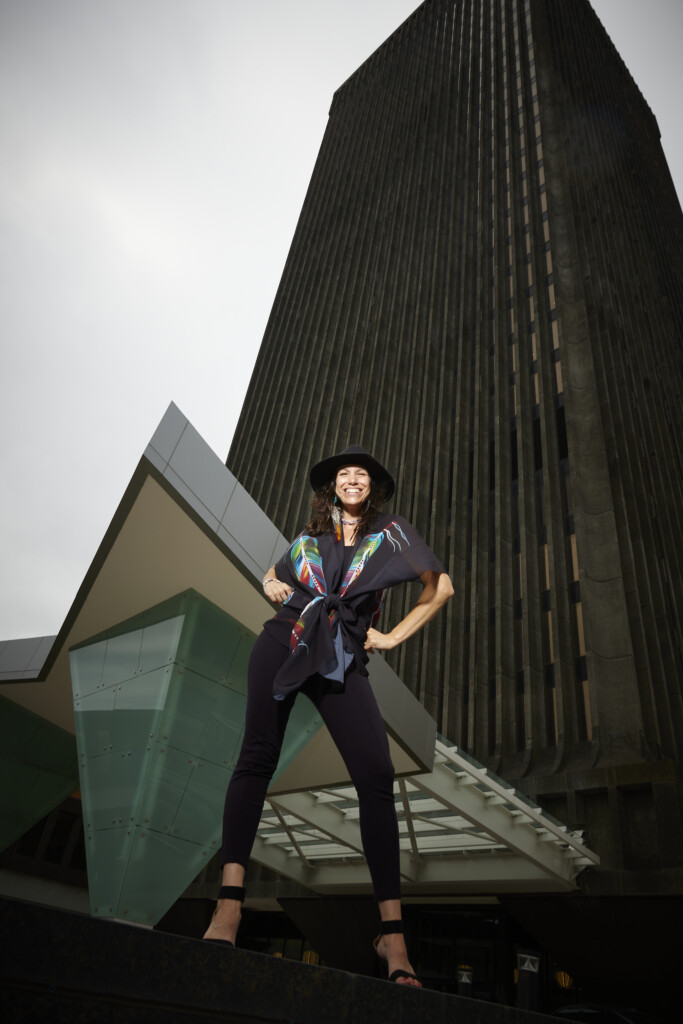Angelina Hilton has been traveling back to the reservation in Kansas every year since she was a little girl. She recently made the decision to bring her Native traditions and culture home to the people of Rochester.
Native Made, Hilton’s small business, provides marketing services for Native American–owned businesses. She has made it her mission to increase Indigenous visibility and reduce barriers for Native people to enter the marketplace. Last November, she saw an opportunity to share her heritage with her Rochester neighborhood. Hilton hosted Indigenous vendors and presenters at the first Native Made Market at POP ROC, the pop-culture cafe she cofounded with her husband, Jason.
Hilton is listed on the roll of the Sac and Fox Nation of Missouri and is the sixth-generation granddaughter of Rantchewaime (Flying Pigeon) and Iowa Chief Mahaska (White Cloud). Her family moved to the Rochester area when she was a child, where she learned her new home was rich in Native culture and history, being the land of the Haudenosaunee Confederacy. Hilton cherished the road trips twice a year to visit her grandmother and the reservation. Her beloved Gramsy would share the history of their family through chronological photo albums, encouraging Hilton to explore every path and take photos along the way.
After the loss of her grandmother in 2019 and her brother in 2020, Hilton realized she would never be able to go back to the Midwest like she used to. The trajectory of her life was changed. She knew she would have to carry on the stories and traditions—the work that Gramsy had known was so important. Hilton understood that eventually her tribe could become extinct, according to a government measurement of Native ancestry called blood quantum.
Hilton’s nine-year-old son and five-year-old daughter are the seventh generation of Chief White Cloud and wife Rantchewaime, yet they are not federally or tribally recognized as Indigenous. Hilton’s grief shifted to anger, igniting a passion and purpose. She started to volunteer her time working with organizations that advocate for Indigenous Peoples’ rights.
She created a calendar of scenic images she’d taken from all over the continent, called “On Native Land.” A portion of every sale goes to the Native American Rights Fund. One of her favorite photos was taken in Naples, originally occupied by the Senecas, where she spent her childhood building forts and wading in the creek. “For me, this is more than a calendar,” says Hilton. “It’s an opportunity to increase Indigenous visibility in a meaningful way, every day of the year. I want people to recognize that wherever we stand on this land, we are on Native Land.”
Hilton and her calendar will be at this year’s Native Made Market, a gathering of Indigenous artists, educators, advocates and allies. She hopes to immerse people into Native culture in an engaging and impactful way. This year’s market will be held inside Innovation Square right after Thanksgiving on Native American Heritage Day. “We felt it most appropriate to shop local, shop small, and shop Native-made,” says Hilton. “This is an opportunity to teach in a loving way and offer healing and forgiveness during a time of mourning.”
Onondaga Native Jerome Waterman Jr., of Beaver Creations, crafts wampum jewelry. Wampum comes from the quahog shell, a rare resource mainly harvested from Northeastern beaches by the Shinnecock people. Carving wampum into beads is a tedious task. The delicate process, much like working with glass, takes hours of patience. Waterman was drawn to the medium after falling in love with the colors. He says, “We used to use wampum to barter with each other, like currency.” Self-taught, he has been crafting since he was eight years old and is a carpenter, a carver, and a welder. Waterman recalls, “My mother always said I learned the hard way,” he laughs. “And I did. But if I had a chance to do it again, I wouldn’t change it.” (Hilton is wearing jewelry by Waterman in these photos)
Hilton is excited to welcome Waterman to the Native Made market along with award-winning sculptor Dave Farnham. Storyteller Perry Ground will entertain and educate people about the culture, beliefs, and history of the Haudenosaunee Confederacy. Common Ground Health will have information about the launch of the Indigenous Health Coalition. Attendees of the market can enter to win door prizes and shop a wide selection of Native-made goods, including canvas paintings, prints, jewelry, candles, beadwork, dresses, sculptures, and bone carvings from artists such as Heather Hill, Clifford Redeye III, Allan Jamieson, and Rosa Vargas.
Native Made also works with One Tree Planted, donating a portion of revenue to plant trees. Hilton recently worked the land for the White Corn Project in addition to preparing the land on the Onondaga Nation. “My goal is to grow my own corn someday,” she says. “We want to have our own garden that we can use to feed our communities and Mother Earth. Food sovereignty is part of my heart.”
Other organizations doing work to elevate Indigenous creators and scholars in Rochester include the Indigenous Peoples Day Committee and the Indigenous Peoples’ Center. The Rochester Museum and Science Center features Native artifacts, and Rochester Institute of Technology offers the Native American Future Stewards Program. Just outside of Rochester is the Ganondagan State Historic Site, an excellent local asset for history and culture.
Hilton says that talking to our children is a great place to start to teach them that Indigenous people are very much part of our present and future, not just our history. As for her own children, Hilton keeps her kids connected to their Indigenous heritage by taking annual trips to the reservation in Reserve, Kansas. It’s important to Hilton that her children see where their ancestors lived and spend quality time with their living relatives who can pass down stories about their childhood and experiences.
There are more than 560 federally recognized tribes, pueblos, villages, and communities across this continent. “When we look at the history of this land, it is not pretty,” Hilton reminds us. “Dominant culture looks at this land as the United States of America, instead of through the eyes of the original people who know that this land consists of hundreds of nations. One thing we all have in common is that we are human and should be treated as such.”
Native Made Market is a great way to honor this history and come together. Hilton says, “I feel we are building bridges between communities in a way where folks can respect one another, reconcile with the past and the present, and work together for a better future.”
Native Made Market
Innovation Square
100 S. Clinton Ave.
Saturday November 25
11a.m. to 5p.m.
nativemadehq.com
Views: 23






